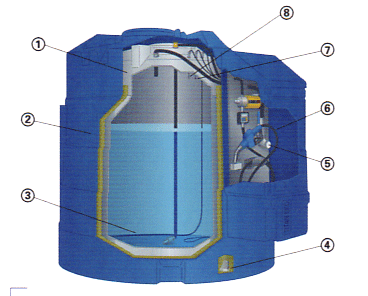
Quick Links
Adblue FAQ's |
If you can't find the anwser to your question
Ask your own here
Where does the name Adblue come from?
Adblue was created vy an international working group VDA (Verband Der
Automobilindustry E.V.) is a registered trade mark with world wide property
rights a licence is required.
Has the technology been field tested?
Adblue has been driven and tested over milliions of kilometres. It has
also been tested under extreme weather conditions, in Spain and Finland.
Will AdBlue be available at public petrol stations?
No, mostly Adblue will be stored and take place at a home base. AdBlue
will not be available at public petrol stations.
What is the life storage of Adblue?
Adblue's storage life is up to maxium of one year. It has to
be kept in in the correct conditions, for instance correct temperature,
making sure packaging is sealed.
What is special about Adblue?
AdBlue is a pure solution. It is reliable after extensive testing and
is environment friendly.
What happens if a heavy duty engine runs without AdBlue?
This will result in crossing the allowed emission levels, for the diesel
engine runs in a fuel optimized way, which has a negative impact on the
NOx emission. For that reason sensors are placed in the exhaust pipe to
measure the NOx emission. The measurement results are stored in the OBD-system
(On Board Diagnostic) and are periodically controlled.
Can diesel be mistaken for AdBlue?
To prevent this from occuring, measurments have been implemented on the
interface between the AdBlue tank and the fuel pump nozzle. The diameter
of the AdBlue fuel pump nozzle is smaller than for the diesel. This prevents
diesel being filled into the AdBlue tank.
What materials are suitable for use with AdBlue and which are
unsuited?
Plastics and stainless steels do not cause any problems. Strickly avoid
contact with copper, zinc and mostly Aluminium. AdBlue contaminated with
these elements damages the catalyst.
What incentives are there for low-pollutant vehicles in Europe?
Adblue in Britain- Reduction of the road tax (vehicle excise duty)
Adblue in Germany - lower toll charges; EURO 4 until 1st October 2006;
EURO 5 until 1st October 2009
Adblue in the Netherlands- The depreciation (VAMIL) of the truck can be
deducted in the first year of use, instead of over its economic service
life (max. 45,000 €)
One-off additional tax deduction (MIA) of 15 % of the purchase price (max.
6,750 €)
Reduced price of the Euro-vignette, depending on the emission class of
the truck's engine
Adblue in Denmark, Sweden-
Reduced price of the Euro-vignette, depending on the emission class of
the truck's engine
Adblue in Austria-
Exemption from the ban on night-time driving on the Inntal motorway between
10 p.m. and 5 a.m.
Albania, Bosnia-Herzegovina, Bulgaria, Croatia, Macedonia, Moldova, Montenegro,
Rumania, Russia, Serbia, Turkey, Ukraine, Belarus
Depending on the Euro standard of the truck, permits for transit traffic
to and from Western European countries (EU + CH + N) are limited (CEMT
regulation); low-pollutant trucks are granted more generous quotas to
companies located in these countries

| 1 - Tank in Tank construction with insulation (optional) | 5 - 2" fill connection |
| 2 - 110% Bund | 6 - Equipped with Dispensing unit (calibrated dispensing optional) |
| 3 - Optional Heating Cable | 7 - Level Sensor |
| 4 - Leak Sensor | 8 - Overfill Sensor |
